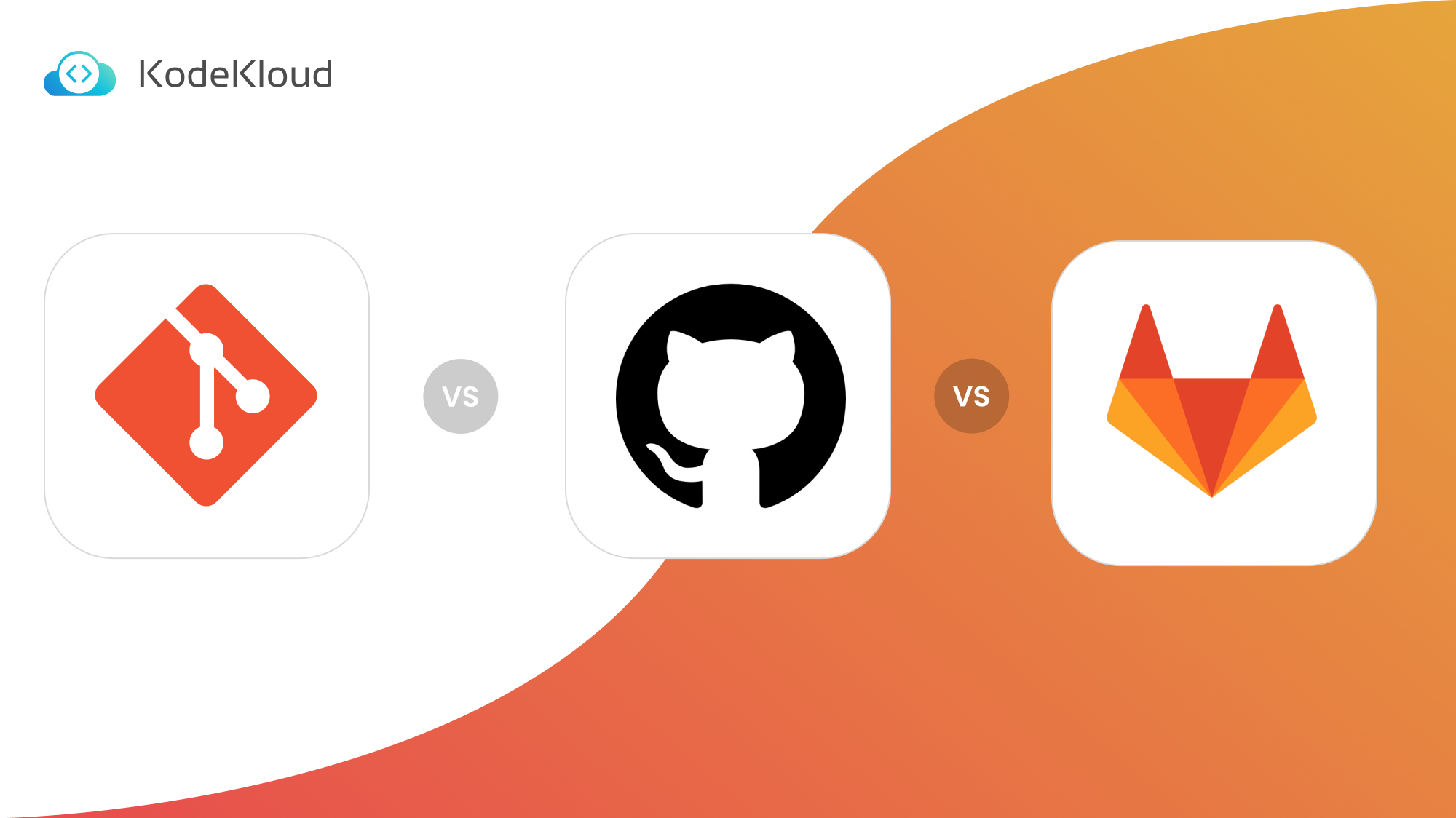Highlights
- Core Functions: Git is the underlying version control system, while GitHub and GitLab are web-based platforms that host Git repositories and provide collaboration tools.
- Hosting Models: GitHub is primarily a cloud-based service (SaaS) owned by Microsoft, whereas GitLab offers both SaaS and robust self-hosted options for greater control.
- CI/CD Integration: GitLab is renowned for its built-in, all-in-one DevOps platform with native CI/CD, while GitHub leverages GitHub Actions for automation.
- Community Focus: GitHub is the hub for open-source projects and social coding, making it ideal for public collaboration.
- Workflow: Git manages the history of your code locally; GitHub and GitLab facilitate sharing, code review (Pull/Merge Requests), and project management.
Battle of the Gits? Well, not so much a battle as Git, GitHub, and GitLab act as complementary tools in the software development lifecycle.
Git forms the foundational backbone of version control, while GitHub and GitLab build upon its capabilities, offering a comprehensive ecosystem for developers. Though distinct, these tools work in harmony to streamline the development process.
In this article, we'll explore the differences and similarities between each and guide you on when to leverage them based on your project's needs. We will dive deep into the git vs github vs gitlab comparison to help you make informed decisions.
Key Takeaways
- Git, GitHub, and GitLab work together to enhance the software development process, each offering unique features.
- GitHub is popular for open-source projects and community-driven development.
- GitLab stands out as an integrated DevOps platform with comprehensive CI/CD pipelines and security features..
What is Git?
Git is a free and open-source distributed version control system designed to handle projects of any size with speed and efficiency. Unlike centralized systems, Git allows developers to work independently with a full copy of the codebase on their local machines.
Git’s Key Features
Let's explore the standout features that make Git an indispensable tool for modern software teams:
- Branching and Merging: Git's powerful branching model enables developers to create separate branches for features, bug fixes, or experiments, seamlessly merging them back into the main codebase after review.
- Distributed nature: Every developer has a complete local repository, eliminating single points of failure and enabling offline work.
- Staging area: The staging area provides granular control over what changes are committed, enhancing code organization and ensuring only intended modifications are recorded.
- Lightweight and fast: Git's efficient design allows for lightning-fast performance, even with large codebases and complex projects.
While Git excels at managing source code, let's look at how platforms like GitHub and GitLab build upon its capabilities. Understanding these git basics is the first step in mastering modern development workflows.
To learn more about Git, check out the blog How Git Works.
What is GitHub?
GitHub is a cloud-based hosting service that provides a user-friendly web interface for managing Git repositories. It allows developers to store, share, and collaborate on their codebase with teams or the open-source community. In 2018, GitHub was acquired by Microsoft, further solidifying its position as a leading platform for software development.
GitHub’s Key Features
Here are the standout features that make GitHub a powerful addition to the Git ecosystem:
- Remote repository hosting: GitHub's core functionality is hosting Git repositories remotely, providing a centralized location for developers to push and pull code changes.
- Collaboration and Social coding: GitHub fosters collaboration by allowing developers to follow projects, contribute code, and interact through discussions, issues, and pull requests.
- Issue tracking: GitHub's issue tracking system enables teams to report bugs, propose new features, and manage project tasks effectively.
- Pull requests and Code review: GitHub's pull request mechanism streamlines the code review process, allowing developers to propose changes, receive feedback, and merge code into the main codebase.
- Project management tools: GitHub offers integrated project management tools, such as boards, wikis, and project tracking, to help teams organize and manage their development workflows.
Check out our blog post to learn How GitHub Works.
What is GitLab?
GitLab is a web-based platform that streamlines development workflows. It does this by merging Git repository management with continuous integration (CI), deployment, and collaboration tools. GitLab facilitates code versioning and team cooperation and automates the pipeline from development to deployment, simplifying the entire software lifecycle within its unified platform.
GitLab’s Key Features
Let's explore the standout features that make GitLab a powerful DevOps platform:
- Repository hosting (similar to GitHub): Like GitHub, GitLab provides a central location for hosting Git repositories, enabling teams to collaborate on code and manage version control.
- Continuous Integration/Continuous Deployment (CI/CD): One of GitLab's standout features is its built-in CI/CD pipelines, allowing teams to automate the entire software delivery process, from code commit to production deployment.
- Issue tracking and project management: GitLab offers robust issue tracking and project management tools, helping teams organize and prioritize tasks, bugs, and feature requests.
- Code review and collaboration: Similar to GitHub's pull requests, GitLab's merge requests facilitate code review and collaboration among team members, ensuring code quality and consistency.
- Integrated DevOps tools: GitLab provides a comprehensive DevOps toolchain, including features for container management, monitoring, and security scanning. This streamlines the entire development lifecycle within a single platform.
With a strong focus on DevOps practices and an integrated toolset, GitLab caters to organizations seeking a more seamless and automated software delivery process.
Git vs. GitHub vs. GitLab
As we've explored the individual capabilities of the 3 platforms, it's essential to understand their distinctions and commonalities. The following table provides a high-level comparison across various features and aspects, highlighting the git vs github vs gitlab landscape:
Table: Comparison of Git, GitHub, and GitLab
As evident from the table above, Git, GitHub, and GitLab share a common foundation: Git. However, the key differences emerge in the following areas:
Purpose and Focus: While Git is solely dedicated to version control, GitHub caters to social coding and open-source communities, and GitLab sets itself apart as an integrated DevOps platform, offering comprehensive CI/CD pipelines and a seamless toolchain for the entire software development lifecycle. This is the core difference between git and github and other platforms.
DevOps and CI/CD Integration: GitLab stands out with its extensive built-in CI/CD capabilities and automation, allowing teams to streamline their software delivery processes. GitHub offers robust CI/CD features through Actions.
Collaboration and Project Management: Both GitHub and GitLab provide robust collaboration tools, including issue tracking, code reviews, and project management features. However, GitLab offers additional DevOps-specific project management tools, such as boards and milestones.
When to use Git, GitHub, or GitLab
This section will guide you through the common situations where one tool might be preferred over the others.
- Git: Essential for Any Project Involving Version Control
Git is the foundational version control system that underpins the software development process for countless projects worldwide. Regardless of the project's size or complexity, Git is an indispensable tool. Whether you're a solo developer or part of a large team, Git is a must-have tool in your development arsenal. It is one of the most critical version control tools available today.
- GitHub: Popular Choice for Open-Source Projects and Public Repositories
GitHub’s vibrant community, social coding features, and seamless collaboration capabilities make it an attractive choice for developers and teams looking to contribute to or leverage open-source software. If your project involves open-source development, GitHub can streamline your workflows and foster effective collaboration.
- GitLab: Ideal for Secure and Comprehensive DevOps
GitLab shines as the preferred choice for organizations, as well as those seeking a comprehensive DevOps toolchain. If your organization requires advanced DevOps capabilities, GitLab's toolset can help you achieve a seamless development lifecycle. Additionally, its support for self-hosting and hybrid deployment models ensures that you can meet your organization's specific security needs. A detailed gitlab vs github comparison often reveals GitLab's strength in enterprise-grade, self-managed environments.
Conclusion
In software development, the choice of tools is paramount to delivering high-quality software. By leveraging the complementary nature of Git, GitHub, and GitLab, you can create a development ecosystem that seamlessly integrates version control, collaboration, and DevOps practices, enabling your team to focus on delivering high-quality software solutions that drive innovation and success.
Enroll in our Git for Beginners course to learn and practice more Git concepts.
FAQs
Q1: What is the main difference between Git and GitHub?
Git is a distributed version control system that runs locally on your computer to track changes. GitHub is a cloud platform that hosts Git repositories and provides collaboration features. Understanding the difference between git and github is crucial: one is the tool (Git), and the other is the service (GitHub).
Q2: Can I use Git without GitHub or GitLab?
Yes. You can use Git locally on your machine to track changes without ever pushing to a remote server. However, using a remote host like GitHub or GitLab is recommended for backup and team collaboration.
Q3: Which is better for CI/CD: GitHub or GitLab?
Both are powerful. GitLab allows for a more integrated experience with its built-in Auto DevOps features, making it a favorite for enterprise pipelines. GitHub Actions is also very robust and benefits from a massive marketplace of community-built actions.
Q4: Is GitLab open source?
GitLab offers an open-core model. The Community Edition (CE) is open source and free to host yourself. The Enterprise Edition (EE) includes proprietary features for paid subscribers.
Q5: How do I choose between git vs github vs gitlab?
You don't choose between Git and the others; you use Git with one of the others. Choose GitHub if you want a massive open-source community and ease of use. Choose GitLab if you need a complete, self-hosted DevOps platform with built-in CI/CD control.
















Discussion